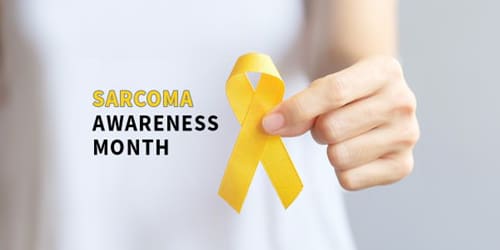Sarcoma Awareness Month runs for the whole of July.
Sarcomas are rare cancers that develop in the muscle, bone, nerves, cartilage, tendons, blood vessels and the fatty and fibrous tissues.
They can affect almost any part of the body, on the inside or the outside.
Sarcomas frequently affect the trunk, arms, and legs. They can also develop in the female reproductive system (gynaecological sarcomas), the stomach, the intestines, and the area below the belly.
Less than 500 people in the UK are diagnosed with bone sarcomas each year, making it an extremely uncommon type of cancer. Sarcomas do not always arise from bone malignancy.
Soft tissue sarcomas can affect any part of the body; they develop in supporting or connective tissue such as the muscle, nerves, fatty tissue, and blood vessels. Soft tissue sarcomas include:
GIST is a common type of sarcoma; it develops in the gastrointestinal (GI) tract, a long tube running through the body from the oesophagus (gullet) to the anus (back passage) and includes the stomach and intestines.
The uterus (womb), ovaries, vagina, vulva, and fallopian tubes are all affected by gynaecological sarcomas, often known as “gynae sarcomas.” Uterine sarcoma is another phrase you might have heard. Women of any age can be impacted by them.
The retroperitoneum is where retroperitoneal sarcomas develop. This region is located behind the peritoneum, which lines the abdominal cavity and protects the internal organs. The major blood vessels, kidneys, pancreas, and bladder are all situated in the retroperitoneum, which is deep into the belly and pelvis and behind the lining of the stomach.
Due to the rarity of sarcoma, much more research is necessary to fully understand how these malignancies arise as well as the most effective ways to identify and treat them.
If sarcoma is detected early, when treatments can be used and before the disease has spread to other body areas, people can survive the disease. Patients must be referred as soon as possible to a specialised sarcoma team.
Facts and figures
There are 3 main types of sarcomas: soft tissue sarcoma, bone sarcoma and gastrointestinal stromal tumours (GIST).
- There are around 100 different sub-types of sarcoma
- 10 people every day are diagnosed with sarcoma in the UK
- About 3,800 new cases of sarcoma are diagnosed each year in the UK which makes up approximately 1% of all cancer diagnoses
- Every year 3,330 people are diagnosed with a soft tissue sarcoma (including GIST)
- 500 people are diagnosed with a bone sarcoma every year.
Sarcoma Support Line
You can email them at supportline@sarcoma.org.uk.
Or you can free phone 0808 801 0401. They are open Monday – Friday 10 – 3 (except bank holidays).
You can also text 07860 058830 for those times you don’t feel like talking.
Extra Support
Along with the assistance you receive from your doctor and the expert sarcoma team, you may need additional help.
They are available to speak to Monday to Friday, 10 am to 3 pm.
They can also put you in touch with sarcoma support groups, which provide you the chance to interact with others going through a similar experience.
There is no right or wrong way to feel or react to diagnosis.
You could be upset, unhappy, or worried about the future. You could be worried about how the news will affect your loved ones as well. Discussing your worries with family or friends may make you feel better.
You might find it beneficial to discuss your diagnosis with your doctor or clinical nurse specialist for sarcoma. They’ll be able to reply to any questions you might have.
They could also be able to arrange for you to see a counsellor for additional help, giving you a private and secure setting to voice your worries. Your GP will have access to neighbourhood counselling programmes that can support cancer patients.
You may also find this list of the support and services offered by other organisations helpful which can be found on the Sarcoma website https://sarcoma.org.uk/
We hope this information has been helpful.
If you would like to book onto one of our First Aid or Mental Health First Aid Courses, please call us on 01276 586943 or email us at admin@crosscountiestraining.co.uk for hassle-free bookings.
